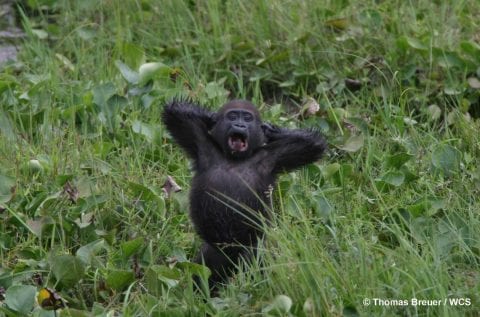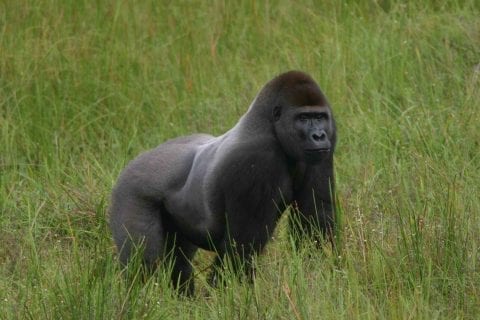Posted In Conservation | 23rd September 2016
Mbeli Bai Study and the Jana Robeyst Trust Fund, Republic of Congo
Western lowland gorillas are listed as Critically Endangered on the IUCN (International Union for the Conservation of Nature) Redlist. Their population is expected to fall by 80% between 2005 and 2071. The main threats are illegal hunting, diseases (especially the highly contagious Ebolavirus), habitat loss and climate change. The slow reproductive rate of gorillas not only makes population recovery slow but also makes the collection of life history data very time-consuming. This data is essential for establishing effective conservation strategies for this subspecies of gorilla.

In 2010, Dublin Zoo began supporting the Mbeli Bai Study in the Republic of Congo. This project has been collecting valuable long-term data on gorillas in Mbeli Bai in the Nouabalé-Ndoki National Park since 1995. The national park is a rare example of an intact forest wilderness with low human disturbance.
Not only is this area an important stronghold for western lowland gorillas, but it is also home to forest elephants, chimpanzees, approximately 300 bird species and thousands of plant species. The Mbeli Bai Study provides a deterrent to hunting and logging. In fact, this area of the national park has been free from illegal human activities for over 20 years! The study also engages in local community outreach programmes and international awareness raising.

[Image credit: Thomas Breuer]
The Mbeli Bai study has developed into a prominent research site with the largest and longest-running data set on Western lowland gorillas available and an impressive track record of scientific publications. The study provides an example of how research can ensure conservation and safeguard wildlife and their habitats.
In addition, it has become an important site for the training of young Congolese naturalists and researchers, for environmental education and for eco-tourism. Due to its location and continuous research presence, the MBS has effectively deterred poaching from the area.
Finally, the study notes any unusual health signs for indications of Ebola or other diseases in gorillas. The work carried out by the Mbeli Bai study is making a real contribution to the conservation of western lowland gorillas.
In 2016, Team-leader Helen Clarke-Bennett travelled to the Congo to visit the Mbeli Bai Study, she got the opportunity to meet a researcher called Jana Robeyst. Sadly, soon afterwards Jana was tragically killed by a wild elephant.
This is a tribute to Jana Robeyst doing what she loved most.
**The Mbeli Bai Study is a collaboration between the Wildlife Conservation Society and the Government of the Republic Congo.
